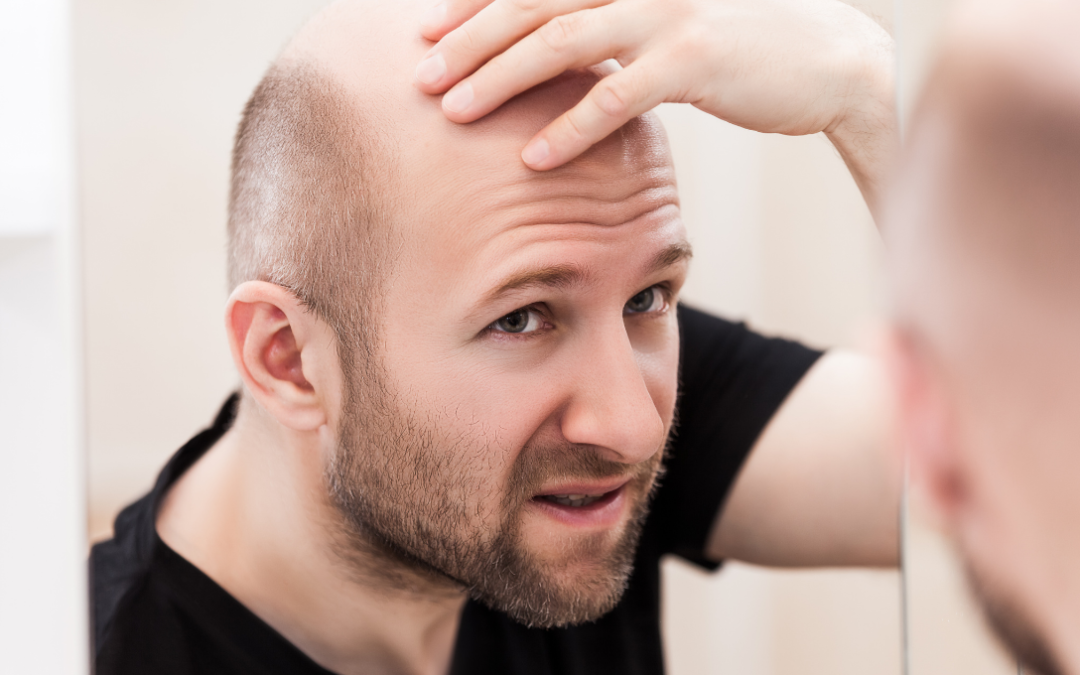Hair loss is a frustrating and often emotional experience, especially when it seems to run in the family. Many people wonder if there’s a specific baldness gene behind it, and whether anything can be done to stop it. The good news? Hereditary hair loss is more complex (and more treatable) than most people think.
At the Dermatology & Cutaneous Surgery Institute (DCSI), we help patients uncover the true cause of their hair loss through advanced diagnostics and personalized treatment. Based in Palm Beach Gardens, with additional offices in Wellington and Delray Beach, we provide trusted dermatologic care throughout Palm Beach County, Florida.
How the Baldness Gene Works
The most common form of genetic hair loss is androgenetic alopecia, also called male or female pattern baldness. It’s triggered by hormone sensitivity, especially to dihydrotestosterone (DHT), which causes hair follicles to shrink over time.¹ Although many refer to the baldness gene as if it’s one specific gene, the reality is more complicated. Hair loss is polygenic, meaning multiple genes contribute to its development, and they come from both sides of your family.² While one key gene is passed through the X chromosome (from your mother), your father’s DNA plays just as important a role. That’s why at DCSI, we evaluate your complete family history of baldness during every consultation.Is Male Pattern Baldness Genetic?
Yes, male pattern baldness genetics are well-established. It typically starts at the crown or hairline and gradually spreads. If you have certain genetic markers, your hair follicles may be more sensitive to DHT, making you more likely to experience hair miniaturization and loss at an earlier age. Still, genetics isn’t the whole story. Stress, smoking, medications, and health conditions can speed up the process. You can read more about these patterns on our male hair loss blog.How Does the Baldness Gene Affect Women?
Female pattern baldness usually shows up as overall hair thinning, especially on the crown. Unlike men, women tend to retain their hairline. The condition often begins after menopause, when hormone levels shift and DHT’s effects become more noticeable. In women, we look at both scalp health and genetics to determine whether hair loss is hereditary or related to something else, such as thyroid issues or autoimmune conditions.Can Baldness Skip a Generation?
It can, and often does. One of the most common questions we hear is, "Can baldness skip a generation?" The short answer is yes. A mix of genetic traits influences hair loss, so even if your parents didn't lose their hair, you still might, depending on how those genes express themselves.³ That’s why we take time at DCSI to explore your full family history and identify early signs before they progress.Can You Predict or Prevent Genetic Hair Loss?
Some DNA tests are now available to help assess your risk for androgenetic alopecia, based on markers tied to the baldness gene. These tests aren’t definitive, but they can give you a better idea of what to expect. The earliest signs often include subtle hair thinning, increased shedding, or slower hair growth. If caught early, treatment can help maintain, or even regrow, your hair. At DCSI, we offer:- Medical therapies like minoxidil or finasteride
- PRP for hair loss using your body’s own growth factors
- Hair transplant referrals for appropriate candidates
- Scalp analysis and lab testing to rule out other conditions
When Should You See a Dermatologist?
If you’ve started asking questions like, “Is there a test to predict baldness?” or “What treatments help with genetic hair loss?” you’re probably ready to speak with a dermatologist. Early action leads to better results. At DCSI, we serve patients across Palm Beach County, including those in Palm Beach Gardens, Wellington,Genetics play a huge role in hair loss, no matter your gender. Learn about the baldness gene from the best South Florida dermatologists! and Delray Beach. Whether you're just starting to notice symptoms or have been managing hair loss for years, we’re here to help.FAQ: Baldness Gene and Hair Loss
Is baldness inherited from your mother or father? Both. While some key genes come from your mother’s X chromosome, others come from your father’s side. What gene causes hair loss? The AR gene is strongly linked to androgenetic alopecia, but more than 250 genetic markers may play a role. Is there a test to predict baldness? DNA testing can identify genetic markers, though results are probabilistic, not guaranteed. Can stress or diet affect hereditary hair loss? Yes. While genes provide the blueprint, lifestyle can influence how and when hair loss appears.Know the Baldness Gene, Take Control
While the baldness gene may raise your risk of hair loss, it doesn’t have to determine your outcome. With early intervention and the right guidance, you can protect your hair health and slow hereditary loss. At DCSI, we combine expert diagnostics with advanced treatment options to help you take control, whether you're in Palm Beach Gardens, Wellington, Delray Beach, or elsewhere in Palm Beach County. Let our team help you make informed choices, backed by science and experience. To get started, schedule your consultation with our team today.Sources
- Harvard Health Publishing. Hereditary-patterned baldness. Harvard Health. https://www.health.harvard.edu/a_to_z/hereditary-patterned-baldness-a-to-z. Accessed August 2025.
- MedlinePlus. Androgenetic alopecia. U.S. National Library of Medicine. https://medlineplus.gov/genetics/condition/androgenetic-alopecia/. Accessed August 2025.


